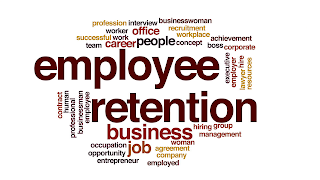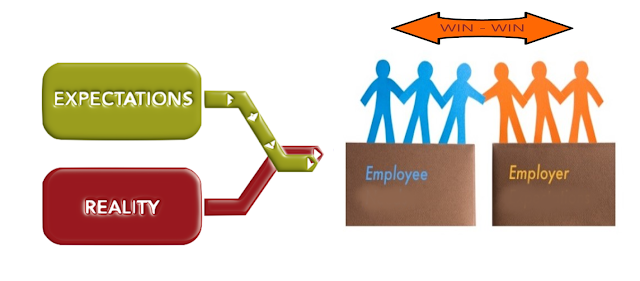Performance Management
Performance Management
What is Performance Management?
Performance management is not an annual
appraisal meeting. It is not preparing for that appraisal meeting nor is
it a self-evaluation. It's not a form nor is it a
measuring tool although many organizations may use tools and forms to track
goals and improvements, they are not the process of performance management.
Performance management
is the process of creating a work environment or setting in which people are
enabled to perform to the best of their abilities.
Performance management is a whole work
system that begins when a job is defined as needed. It ends when an employee
leaves your organization.
Performance management defines your
interaction with an employee at every step of the way in between these major
life cycle occurrences. Performance management makes every interaction
opportunity with an employee into a learning occasion.
Components of a Performance Management System
The performance management system may
contain all of these components, but it is the overall system that matters, not
the individual components. Many organizations have been able to develop
effective performance management systems without all of the following
practices.
It is much better to focus
on followings components to develop an effective performance management system:
- Develop clear job descriptions using
an employee recruitment plan that identifies the selection
team.
- Recruit potential employees and select the most
qualified to participate in interviews onsite.
- Conduct interviews to narrow down your
pool of candidates.
- Hold multiple additional meetings, as needed, to
get to know your candidates' strengths, weaknesses, and abilities to
contribute what you need. Use potential employee testing and assignments
where they make sense for the position that you are filling.
- Select appropriate people using a comprehensive
employee selection process to identify the most qualified candidate
who has the best cultural fit and job fit that you need.
- Offer your selected candidate the job and
negotiate the terms and conditions of employment including salary,
benefits, paid time off, and other organizational perks.
- Provide effective new employee orientation,
assign a mentor, and integrate your new employee into the organization and
its culture.
- Negotiate requirements and accomplishment-based
performance standards, outcomes, and measures between the employee and his
or her new manager.
- Provide ongoing education and training as needed.
- Provide on-going coaching and feedback.
- Conduct quarterly performance development
planning discussions.
- Design effective compensation and recognition
systems that reward people for their ongoing contributions.
- Provide promotional/career development opportunities including lateral moves, transfers, and job shadowing for staff.
With all of these tips and tools, it helps you to develop an effective performance management system, you'll find it easy to put such a system
together. Staying committed and making it work is the hard part. But, you can
do it. Your managers and employees will see the utility.
References
- Heathfield, S M., Performance Management, The Balance Carriers, viewed 08 June 2019, Available at <https://www.thebalancecareers.com/performance-management-1918226>





Dear Rangana
ReplyDeleteAs you describe in your article, performance management is an essential part of any business’s strategy. It is much easier these days for us to gather and analyze data from all touchpoints of our business. As such, setting of Key Performance Indicators (KPIs) and tracking them is not a difficult task.
Agree with you. Making the employee to contribute with their highest performance is essential part of a business to its success. It is a duty of the managers of a business to set appropriate KPIs and tactfully encourage the employee to reach the same.
DeleteRangana, I agree with your facts but strongly believe that performance appraisal system is the most important aspect in overall performance management of an organization since it give all relevant information regarding individual employees performance and behavior. Based on those findings necessary actions could be taken depending on the individual situation.
ReplyDeleteDear Gayan,
DeleteAs you highlighted, performance appraisal system is the most common method that many organizations used to appraise the performance of a individual employee. But my argument is that this system doesn't communicate the real performance since this depends on the person who does the evaluation.
And the same time, performance management is a extensive topic which includes recruiting people, setting KPIs, creating appropriate work environment while motivating the employees to perform in the job with their best abilities.
DeleteDear Rangana,
ReplyDeleteYour article very interesting while I am also agreed with gayan and janaka, since the facts mentioned in their comments are the key evaluation factors of an employee while the same encourages the employees to a organisational target.
Thanks Sachintha for your interest. Every employer's expectation is to get the employees involved to the business with their highest performance. So the managing their performance is significant to any business for its success
ReplyDeleteRangana you well discribed about the advantages of having a strong continuous performance management system . It helps align and track measurable goals, creates an ongoing feedback loop for coaching, and boosts engagement through recognition , but are there any disadvantages to not having ongoing performance management?
ReplyDeletePoorly-implemented performance management will cost the company. If an employee performs well and then feels that he/she was assessed unfairly, there’s little motivation left for him/her to stay with the company. Even if an employee doesn’t quit the company, he/she may become withdrawn and disengaged.
Dear Ayesha,
DeleteThank you for your concerns. I agree that organizations that do not have strong performance management systems can have a negative effect on both employees as well as the organization. If the process is not a pleasant experience, it has the potential to discourage staff too. Therefore the performance management process should be well designed which can be rewarding for both the employee as well as the employer.
This comment has been removed by the author.
ReplyDeletePerformance management plays a very vital character in organizations. It can build the employee or destroy him. My personal observation is still the management in organizations use very outdated tools to measure the performance of employees. As you stated at very first of your article managing or appraising performance cannot be done on annual basis or in another long intervals. This should be a continues process. Further appraising a employee by a single person is unfair. it doesn't reflects the correct performance level of the employee. Hence several methods to be used to measure the performance of the employees and performance developing tools to be kept ready inside organization to carry out the organizational process without any interruption.
ReplyDeleteDear Janaka,
DeleteI totally agree with your views. With time and technology, workplaces have evolved broadly and needed better appraisal methods than the traditional methods of performance appraisal. It’s been observed that traditional methods lay more emphasis on rating of individual’s personality traits, whereas the modern methods of performance appraisal lay more emphasis on the evaluation of job achievements, which is more objective and worthwhile. Most of the earlier performance management methods depend on the judgement of the raters, due to which sometimes the evaluation gets biased. Therefore forward thinking companies should use modern methods of performance appraisal rather than the traditional ones such as Assessment Centres, Management by Objectives (MBO) Behaviorally Anchored Rating Scales (BARS), 360 degree appraisal, Cost Accounting Method etc...